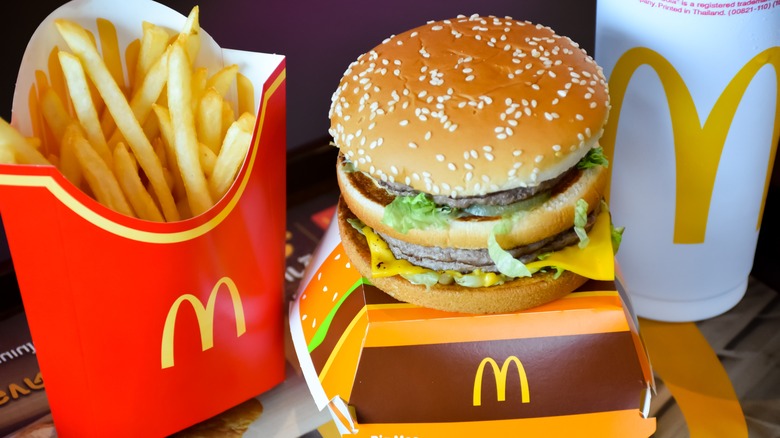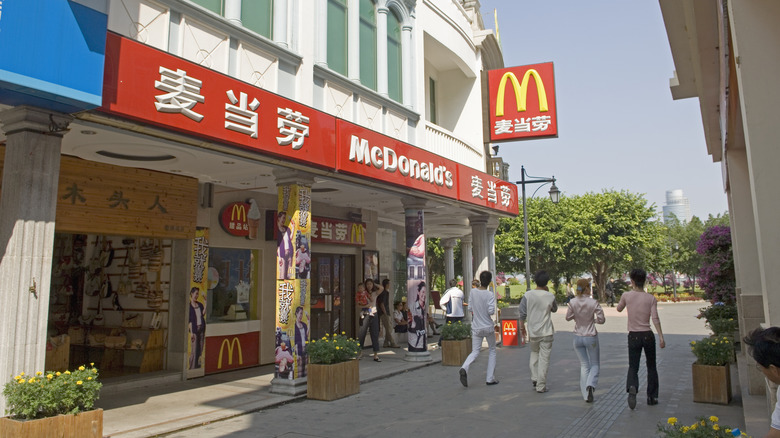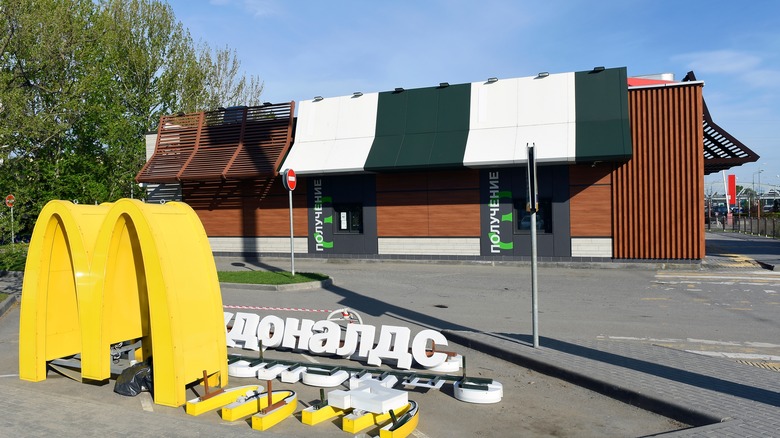How Many McDonald's Are There In The World?
The lore of McDonald's — from lone hamburger stand in 1940 San Bernardino to the well-oiled machine of supply chains, operations, and marketing that makes its scores of restaurants run — is well known in the U.S. Today, we marvel at the scale of growth of Jeff Bezos' Amazon or Howard Schultz's Starbucks, but 25 years ago, the names on the tips of our tongues were Sam Walton and Ray Croc. And while McDonald's doesn't quite crack the top fifth of the Fortune 500, because of the broad appeal and accessibility of its products, there are few brands as recognizable and well-liked.
Folks are entitled to their opinions, of course, but to regard McDonalds or fast food (too often conflated with "American food") as unfashionable is to misunderstand the strategy entirely. Can you find better burgers on the market? Sure you can. But McDonalds isn't running one or hundreds of locations anymore; the proven method of its growth has been to capture the widest possible swath of the market through a trifecta of convenience, affordability, and consistency. That's why it has over 40,000 restaurants operating in more than 100 countries.
It takes a lot of established trust to make customers feel confident ordering a Big Mac or McD's latest chicken sandwich, whether they're flying out of Atlanta or into Tokyo. And as titanic an organization as it is, it preempts detractors with interesting regional options and whole-hearted efforts to adapt to local culinary tradition. We submit as evidence its global takes on fries as well as the pastry counters found in McDonalds locations in Italy and France.
The McD's location leaderboard
It will surprise no one that's driven at least an hour in any direction, just about anywhere in the U.S. that it has a firm hold on the top spot. Though, naturally, where there's more economic activity, there's more Big Macs and McChickens slung. While Trader Joe's stores pop up where average disposable income is higher, the number of McDonald's locations tracks pretty closely with individual states' gross domestic products. For GDPs the top six states rank as follows: California, Texas, New York, Florida, Illinois, Pennsylvania, while according to HasData, the states with the most McDonald's are California (1,304) Texas (1,237), Florida (792), Illinois (699), Ohio (655), and New York (628). Collectively those states make up about 40% of the roughly 13,000 locations in the U.S.
But that number doesn't get us anywhere close to the global 40k, so where do the majority of the rest reside? At a distant second is China with nearly 5,000 McDonalds restaurants, followed by Japan with about 3,000, as well as France and Canada, both with about 1,500. The rest are scattered around the globe, mostly in urban markets, where those in the company who approve franchises feel the restaurants could get a foothold.
Where you won't find any/many McDonald's
There are a number of reasons why McDonalds don't exist everywhere, but in most cases, it's at the discretion of the corporation. In areas where it feels it could not adequately maintain operations because of potential supply chain issues or inconsistent access to necessary raw ingredients like beef, it has opted not to put down roots. This is at least part of why McDonalds is absent from much of Africa, the Middle East, and Central Asia.
There are countries where, because of anti-western or anti-capitalist sentiment, or just concern over what it would mean for local diets, McDonald's has actually been banned – Bermuda, Bolivia, Iceland, Iran, Macedonia, Montenegro, North Korea, Yemen, and Zimbabwe. McDonalds has also tried and failed to operate in many places. While occasionally you'll see shuttered locations in the U.S. because of over-agressive expansion, it's uncommon here precisely because Mickey D's is often the place people turn to for quick and cheap eats. But in places where the culture of affordable, street foods is stronger, like Vietnam, McDonalds had a rough go of it, and eventually bowed out.
Other times, it's political pressure that exceeds the cost of doing business. Not long after Russia moved forward with its attempted annexation of Ukraine, McDonalds made the decision to withdraw its operations in the country, citing a conflict of values. However, the feeling wasn't mutual, because in short order, copycat company вкус и точка or "Tasty, Period" came in to fill the gap that McDonalds left, serving dupes like the "Fish Burger" and "Grand" (instead of the Filet-O-Fish and Royal Burger).


